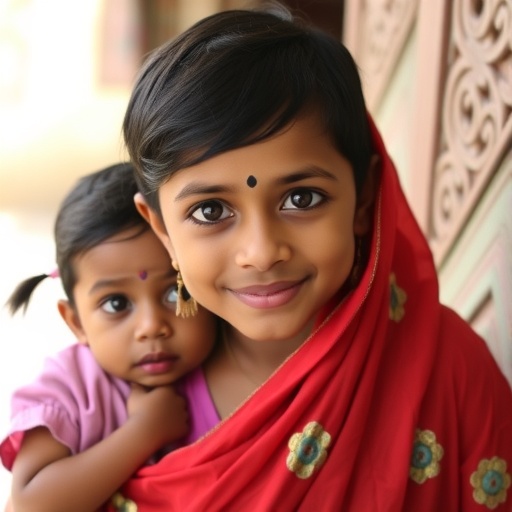In recent years, a significant body of research has surfaced focusing on the intricate social dynamics surrounding family planning and gender preferences, particularly in the context of India’s fertility transition. An important study by Das, Sharif, and Kumar delves into the ongoing societal phenomenon of son preference, investigating how it influences family structures amidst changing fertility rates. The implications of this research extend far beyond academic discourse, reverberating through social policy and public health initiatives aimed at addressing gender imbalances.
The research highlights a persistent cultural bias favoring male offspring in India, where traditional norms and values have perpetuated the idea that sons carry the family name, provide for elderly parents, and ensure social status. As India experiences substantial economic growth and urbanization, these deep-seated beliefs are contradicted by new realities—both social and economic—that complicate the birth preferences within family units. The authors point out that while the preference for sons is deeply entrenched, there are emerging trends indicating a slow but noticeable shift in attitudes toward family planning and child-rearing.
In their findings, Das and colleagues focus on single-child families, a phenomenon that has gained traction in urban areas due to modernization. The study posits that the desire for a single child—coupled with a son preference—affects decisions around family planning significantly. Couples often find themselves in a precarious position where they must navigate between societal expectations and their personal desires. This dilemma is exacerbated by the implications of reproductive health policies and access to family planning resources.
The data collected in this research presents a stark contrast between rural and urban attitudes toward child preferences. Urban families, with increased access to education and resources, are gradually moving towards more egalitarian views on gender. Despite significant progress in urban centers, the researchers uncover that rural families remain more heavily influenced by traditional norms, which can perpetuate gender discrimination. This disparity showcases a critical challenge: how to bridge the gap in societal attitudes across different demographics.
One striking aspect of the study is how economic factors interact with gender preferences. As families become more economically independent, many prioritize small family units for financial stability, which has inadvertently intensified the son preference. Families aspiring for upward mobility often perceive having a son as a way to secure financial and social capital. This complex interplay raises crucial questions about the sustainability of gender norms in the context of economic development.
The authors emphasize the role of education in reshaping perceptions of gender roles within families. Higher levels of education among women have been linked to a reduction in son preference, suggesting that empowering women through education can lead to more balanced gender outcomes in childbirth. This finding points to the necessity of investing in women’s education as a critical strategy for altering entrenched social norms.
Moreover, the study also reveals the psychological dimensions of son preference. The pressures faced by families to conform to societal expectations can lead to significant mental strain on parents, especially mothers who grapple with the stigma associated with having a daughter. This emotional turmoil reflects broader societal pressures that can influence family dynamics and parenting choices, leading to a cycle of preference that sustains over generations.
As India progresses further into the 21st century, the pressures of globalization and modernization bring about new challenges. Social media and the digital landscape have created platforms for alternative narratives challenging traditional son preference. These avenues can facilitate dialogue and community engagement, presenting opportunities for social change.
The journey toward addressing gender imbalance will require systemic change, inclusive education, and robust public policy interventions aimed at minimizing the societal pressures that drive son preference. Current health policies must be recalibrated to reflect changing family structures and dynamics. It is essential for policymakers to recognize the profound connection between gender preferences and fertility rates, as well as the impact of socio-economic factors on these trends.
The study by Das, Sharif, and Kumar serves as a wake-up call for researchers, policymakers, and advocates alike. With the fertility transition underway, officials must pay attention to the associated cultural and social work that needs to be done to change deep-rooted biases. Moving forward calls for an intersectional approach that acknowledges the unique persuasiveness of gender roles within the multifaceted landscape of Indian society.
In conclusion, the timely research encapsulated in this study is a pivotal reminder of the complexities surrounding family dynamics in India. The issues of son preference and single-child families highlight both the struggles and transformations faced by society as it evolves. The interplay between changing economic scenarios and traditional values represents a critical narrative that warrants careful consideration in future discourses on gender, fertility, and family planning.
As we reflect on these emerging trends, it becomes clear that understanding and addressing cultural biases will be essential in forging a more equitable future for families across India. The journey ahead is marked by both challenges and opportunities, but with dedicated efforts, a shift towards balanced gender preferences is achievable.
Subject of Research: Son Preference and Single-Child Families in India’s Fertility Transition
Article Title: Correction: Son Preference and Single-Child Families in India’s Fertility Transition
Article References:
Das, B., Sharif, N. & Kumar, S. Correction: Son Preference and Single-Child Families in India’s Fertility Transition. J Pop Research 42, 55 (2025). https://doi.org/10.1007/s12546-025-09408-8
Image Credits: AI Generated
DOI: 10.1007/s12546-025-09408-8
Keywords: Son Preference, Single-Child Families, Fertility Transition, Gender Imbalance, India, Family Planning, Societal Norms, Economic Factors, Women’s Education.




